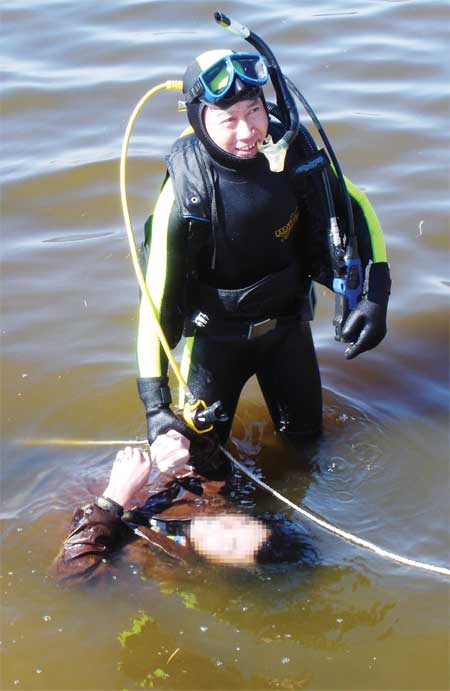Confessions of a corpse-hunter
Cui Jie, 62, has been fishing for drowned bodies in Beijing's waters for 10 years. But he feels his profession has been brought into disrepute by profiteers.
 |
|
In a diving suit, Cui Jie lugs a corpse out of the cold water in March 2006 in Beijing. |
"Unlike them, I do it mostly for the public good," said Cui, criticizing the fishermen in Jingzhou, Hubei Province who charged 12,000 yuan (US$2,000) for each body they found after three college students drowned while trying to rescue kids on October 24, 2009.
"The case was very bad publicity as they made profits from martyrs," Cui told the Global Times.
In a famous photo taken in connection with the case, Wang Shouhai, 72, looked like he was negotiating over prices while hauling a half-sunk body from the Yangtze River. Wang insists the award-winning photo misrepresents him.
Recently, the validity of this photo was questioned, throwing light on the hidden yet burgeoning business in China's dangerous waters.
Chen Bo, Wang's boss and head of a "gangster-backed" salvaging company, got a 15-day detention and was fined 1,000 yuan for blackmailing teachers and students who begged him for help. After realizing the students had sacrificed themselves to save others, he returned 36,300 yuan. But he still does business in the Baotahe area, where rapids and currents continue taking people's lives.
Everybody involved has his own version of the story, according to a thorough inves-tigation by the Golden Lens Award organizing committee, which awarded top prize for the photo in August. But what's the truth?
Public service?
Cui started doing the job after he opened a diving club in 1994. He also collaborated with well-known film directors on underwater construction and rescue.
As a medical graduate, he is not afraid of touching water-logged corpses. "It's just like handling a chair and at night I can hardly see it anyway," he said.
Earning about 5,000 yuan for each body, he said the body-hunt is more of a public welfare undertaking than profit-driven business.
The price can be discussed by both sides, and it depends on how much the family can afford, he said. "We will definitely get the body out once we arrive at the site," Cui said, after handling 17 corpses in the last two months in Beijing's waters.
Compared with greedy fellow workers, he said he was self-disciplined. "I know how far to go and when to stop," he said, mentioning that he hasn't been paid for lugging a female suicide jumper's body on August 20, as the police had promised him.
"I didn't care that much because I had to help them out to keep things under control when a big crowd gathered there," Cui said. It was also not a good time to ask the girl's relatives because they were grieving in shock.
 0
0 







Go to Forum >>0 Comments